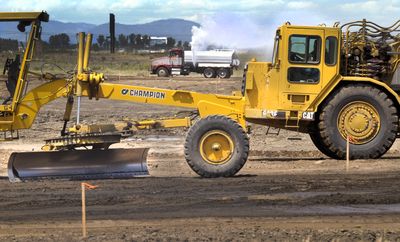Contractors struggle for commercial work
Some may be forced out of business, group director says

Commercial construction activity has reached a low point that many Spokane-area contractors may not outlast, the head of a local industry group said this week.
Wayne Brokaw, executive director of Associated General Contractors-Inland Northwest, said bidding has become ferocious, with local contractors facing competition for work from companies as far away as Tennessee.
Many bids reflect little more than the cost of materials, he said, with contractors willing to discount labor and overhead costs to survive until the economy rebounds.
Area governments that prepared building estimates when the costs of steel, cement and diesel were twice their current levels are opening bid packages often 30 percent below those estimates.
The engineer’s estimate for repaving of the Spokane International Airport tarmac, for example, was $10.1 million. The winning bid from Acme Concrete Paving was $6.7 million.
In Cheney, an estimate on work at the Research and Industrial Park was $2.4 million, Public Works Director Todd Ableman said. The low bid from Sackett Excavating of Nordman, Idaho, was $1.6 million, a deal he said the city accepted “in a heartbeat.”
Ableman said eight bids were submitted for the work, twice the number the city usually receives.
“They’re chasing the work,” Brokaw said. “They’re trying just to keep the company going”
The latest report on Spokane County construction activity from McGraw Hill Construction supports Brokaw’s dire assessment. The industry publication said only $3.5 million in nonresidential construction was expected to break ground in May, down 97 percent from May 2008 and off 57 percent for the year.
Spokane County and city permit statistics are little better.
Of the 143 permits issued through May by the county, just seven worth $14.1 million are identifiable as nonresidential. For the first five months of 2008, 27 commercial building permits worth $21.1 million were taken out.
In the first five months of 2009, the city issued 18 nonresidential permits worth $8.3 million, compared with 19 worth $42.2 million in the same time frame in 2008.
Brokaw said bidding for projects that can be started this year will taper out by mid-July. Contractors that have not secured some work by then will be in trouble, he said.
“Here we are in the middle of June and nothing’s moving,” he said. “I think everybody is a little anxious.”
Brokaw said more confidence in an economic recovery might get companies sitting on projects to commit themselves.
Peirone Produce Co., he noted, recently put out a call for bids a bid for a 70,000-square-foot warehouse. The job went to Vandervert Construction.
“That’s courageous on the part of Peirone, but that’s smart business, too,” he said. “That’s the kind of thing we need.”
Adding to contractor apprehension is a federal Public Works Trust Fund that will be broke by August if Congress does not authorize a cash infusion to offset slumping gas tax revenues, Brokaw said.
Gas-pinching drivers in Washington are having the same effect on state highway construction, Brokaw said.
“This is a huge, huge issue,” he said, that overshadows the work – like the airport tarmac – made possible by the stimulus package.
With contractors and their subcontractors hurting, so is labor. According to Washington Employment Security Department statistics, construction employment in the county is off about 1,300.
“It’s not a very beautiful picture,” Brokaw said. “It’s rather scary.”